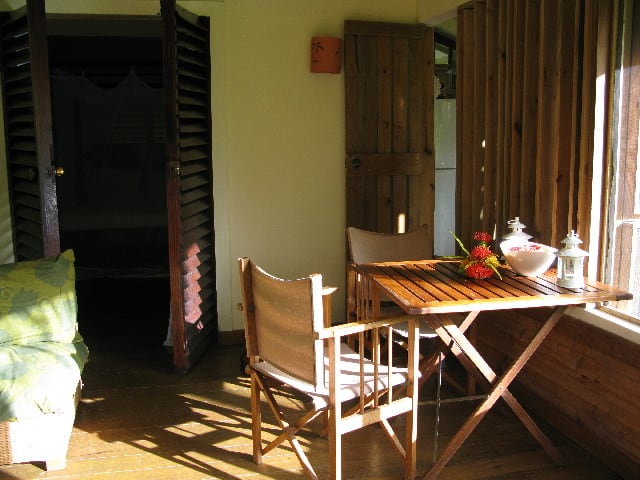This page contains affiliate links. Please read our disclosure for more info.
It’s Travel Money Week on Never Ending Voyage to celebrate
the launch of our travel budget app Trail Wallet.
Travelling on a budget doesn’t have to mean sleeping in hostel dorm rooms and eating baked beans. There are many ways to save on your travel expenses so that you can travel in style and on a budget, without missing out on the experiences that make travel worthwhile. We asked experienced travellers to share their tips.
1) Learn the Language
For me, the biggest money saver by far has been to learn the local language. You can find accommodation on online or newspaper advertisements that are not catered to rich tourists, you can meet locals who will invite you to eat at their home, and on pretty much everything else, you can avoid paying the “English-speaking tax”. You’d be surprised how different the price is if you ask in the right language… And no, you do not have to master the language to do this. Even knowing the basics (at first) can make a huge difference.
In many cases, online ads are still not that great, so just while you are learning the language or haven’t arrived yet, I find that hiring a task-specific Personal Assistant who lives there, can save you heaps of money, since they’ll do the searching for you in the right language. Benny, Fluent in 3 Months
2) Eat Out At Lunch
Traveling on a budget does not mean you can’t eat at nice restaurants. By eating out at lunch you can save significantly while dining in style. Restaurants around the world offer prixe fixe menu (fixed price menu) at lunch for a fraction of their dinner prices. Take advantage and enjoy a decadent meal without the worry on your budget.
Warren and Besty, Married with Luggage
3) Use Travel Points
Flights and accommodation are the two big ticket expenses in travel. There are ways to beat both. I’m diligent about using my premium travel points card to collect points that translate into dollars. I always pay my cards off each month. In one year I usually accumulate about $800 to put towards whatever kind of travel I want. On the accommodation side, I like hostels with private rooms (cheap and cheerful and clean!), apartment rentals and house exchanges. Combine your points-paid flight with a house exchange and you have a real budget-wise holiday. Janice, Solo Traveler
4) Housesit

As digital nomads, we have opted to be homeless in order to travel and see the world. Without a home base, however, we spend time in hotels and rent apartments, but housesitting has become our favorite accommodation option. As housesitters, we have the luxury of staying in someone’s home, for free, in exchange for caring for their house and pets while they are away. This allows us to enjoy creature comforts like having our own kitchen, living room, a patio or a backyard, plus with all the money we save on accommodation, we are able to buy healthier, organic food to cook or eat at better quality restaurants. Best of all, housesits are generally for one month or more, so we get spent quality time living like locals in places all around the world. Dani and Jess, Globetrotter Girls and authors of Break Free: The Ultimate Guide to Housesitting.
5) Seek Out Ethnic Neighbourhoods
Seek out the ethnic neighborhoods, markets and grocery stores for cheap eats and less expensive groceries in big cities in the United States, Canada and Europe. For example, you can stock up on fruits and vegetables at a Turkish market for a fraction of the cost at a regular German grocery store (or market) in Berlin. Same goes for cheap prepared foods – there are places in Chinatown in New York with delicious dumplings for just a couple of dollars while the Mission in San Francisco will keep you well fed not only in great Mexican food with massive burritos (aka, urban food logs), but also Indian and other cuisines. A great way to eat well, meet some interesting people, and help the budget all at the same time. Audrey and Dan, Uncornered Market
6) Be an ATM and Exchange Wizard
First, get an international debit/credit card that doesn’t charge (or pays you back) for all ATM fees, like Charles Schwab. From there, try to only use ATM machines that offer withdrawals in your account’s local currency (i.e. My home bank is in the US, hence I take out dollars) and then, go to a bank or exchange place (in your current location) to convert money to local currency to get a much better exchange rate. It’s one extra step in the process, but it has saved me hundreds over the past three and a half years of traveling through Latin America. Gareth, Tourist 2 Townie
7) Stay with Locals
From traveling around the world for 2+ years, I learned so many ways to save money and realized that traveling can be so much cheaper than many think! My biggest tip would be to do home stays like Couchsurfing or Airbnb. Not only do you save a lot of money (especially in expensive places like London!), staying with locals is, hands down, the best way I’ve enriched my travels. You simply get a more authentic experience. You can live in ‘real’ neighborhoods where locals live, you have a kitchen in which you can cook meals (and save more cash!), and you instantly have a new friend in a foreign land giving you firsthand knowledge of their city, who often remains a friend for life! Lisa, LL World Tour
8) Plan in Advance
Travelling in style is something any budget traveller can do with enough practice and planning. One particular tip I’ve picked up over the years is to plan flights in advance. Often airlines want to have a guaranteed numbers of seats filled and offer great deals on flights booked well in advance. A perfect example of this is when I just recently booked a flight from Kuala Lumpur, Malaysia to Phnom Penh, Cambodia for March 29th, 2013 with Air Asia for 4 cents on a special promotion. Not only will I be travelling in style but I’ll also be avoiding at least two international border crossings in the process if I were to hypothetically do the journey overland. It’s worth comparing all of your options when it comes to transportation. Sometimes the most direct and stylish route is also the most ‘budget friendly.’ Nomadic Samuel
9) Travel in Low Season
Travel during the low-season to get cheaper rates on accommodation. In SE Asia, I often just showed up and bargained my accommodation. I didn’t have to worry about anything filling up. Other things may be cheaper as well like transportation and admission tickets. Michael, Art of Backpacking
10) Choose the Right Destination
Choosing the right destination is the best way to travel in style and on a budget. For example, you can stretch your dollar much further in South East Asia than you can in Europe. When you choose the right country to travel to, you can stay in three star hotels, while dining out on delicious meals every day for peanuts. Instead of an all-inclusive trip to the Caribbean, rent a beach bungalow in Indonesia or Thailand for a fraction of the cost of staying at a resort. You won’t be able to afford a day at the spa in New York City, but in Thailand you can get a great massage for 10 Bucks! So always think, location, location, location. Dave and Deb, The Planet D
11) Don’t Pay For Accommodation
I’ve traveled full-time for over six years, and in 2011 I paid $173 for accommodation – for the whole year. Although I’m budget-conscious, I don’t live a “budget life”: I fly business class, drive convertibles, and stay in amazing places. The biggest money-saver is getting free accommodation. By volunteering or house-sitting in trade for my digs (and sometimes meals), I’ve milked goats, painted murals, cared for kangaroos, managed marketing plans, cooked, sailed, and more. These volunteer experiences allowed me to stay for a while and have an immersive experience.If volunteering isn’t your preference, then house-sitting or home-exchanges are perfect. You’ll need to care for the home (and sometimes pets), in exchange for a chance to experience local life.
More ways to get free accommodation (along with tips on transportation, getting work abroad, etc) are available as part of my free intensive series: How to Travel Full-Time in a Financially Sustainable Way. Nora, The Professional Hobo
12) Stay in Family-Run Inns in South America
Hostels are a relatively new concept in South America so many of the newer, nice ones are for foreigners and you rarely see other people from South America. However, hospedaje or hostería is a common form of lodging and frequented by locals. These are what we would call an inn or B&B and is usually a local, family-owned place. Here you can get a room, often with a television, private bathroom and wifi for less than you would pay for a hostel dorm room. Ayngelina, Bacon is Magic
13) Try Camping
We camped for five months from Uganda to South Africa. What? You call that style? Stop and think for a minute of the benefits. On average it cost $1-5 a night, which meant we had more money to enjoy stylish activities like safaris, gorilla trekking and white water rafting. We also camped in some of the best locations: at the edge of the escarpment overlooking the Rift Valley, on Zanzibar beaches and Lake Malawi shores, beside the St Lucia estuary where hippos roamed at night, next to the Nile River rapids and in the middle of the African game parks surrounded by the lion’s roar and guarded by the Masai warriors. Now that is what I call style. Read more tips for budget travel in Africa. Caz and Craig, Y Travel Blog
14) Skip the “Must-Sees”
It is not always necessary to see absolutely every temple, or site, that a place has to offer. We often don’t visit the biggest ‘must-see’ as we find it marred by hoards of people also trying to see it. We’ll opt for lesser sites that still give a sense of history, culture, or art but that are often less expensive and less crowded. Sometimes sites will allow free entrance to the grounds or gardens but you must pay a fee for entering the building. Often these areas are the most beautiful, and worthwhile, parts of the visit! Gillian, One Giant Step
15) Compare Booking Sites
When researching hostels try to spend an extra few minutes comparing the different hostel booking websites. Sometimes one booking agent is significantly cheaper than the other. Also, when you decide on a hostel, check to see if the hostel has it’s own independent website. One time I walked into a hostel and while in the lobby checked out the rates on it’s own website and it was 10 dollars a night per person cheaper to book on the hostels own independent website. Definitely worth the few extra minutes research! Jade, Our Oyster
16) Reduce Money Spent on Small Things
In my opinion, one of the best ways to save money while traveling is to simply reduce the amount you spend on small unnecessary things. I personally wash my clothes in a sink or bucket, saving money each week, and I also just think it’s more convenient. This may not be the case for you, perhaps it’s stopping drinking soda, or not purchasing too many souvenirs. My point is, it’s the little things that really add up over time, so if we reduce the amount of little unnecessary things we spend on, we can begin to save. Mark, Migrationology
17) Look for Restaurant Coupons or Pack a Picnic
One of our favorite ways to save money while traveling is to eat our larger meal for lunch when prices are lower. This way we can experience a nicer restaurant for a fraction of the price. If we are traveling in the states, we always look online for any coupons the restaurant offers. For dinner, we like to grab a bottle of wine and some snacks at a local grocery or farmers market to eat outdoors, somewhere with a view. However, this only works in places that are not cold at night! Christy and Scott, Ordinary Traveler
18) Visit Free Attractions
There are thousands of free attractions in almost every destination. These are two ways to find them:
- The best transportation to go around any city is walking. You’ll miss half of it if you see it through a touristic bus’ window. There are some beautiful monuments and landmarks… but you don’t have to go inside all of them. I have a growing list of attractions that I regret having paid for in order to go in (or up). Number one goes to Tokyo tower in Japan.
- Investigation: Lots of reading before your trip will save you a lot of money. Even the most famous attractions in the world have at least one day in the month when they are opened for free. Many others will offer a variety of discounts that you can take advantage of.
19) Get A Student Card
If you’re a student of any sort, apply for an International Student Identity Card before you start your travels. The card will set you back about $25 per year, but it is accepted as a student ID just about everywhere in the world – meaning you can use it to score student discounts wherever you’re traveling. You can use this card to get discounts on everything from tours to hotel rooms to attraction entrance fees to even meals. In many cases, you can get up to half off with an ISIC. This can do a lot for your budget, especially in pricey parts of the world like Europe. If you’re not a student but under age 26, you can get an International Youth Travel Card, which will get you similar discounts. There are also International Teacher Identity Cards for teachers and professors. Amanda, A Dangerous Business
20) Shop at Supermarkets
I love hitting up supermarkets in different countries—they’re often cultural experiences in themselves, and they’re also the cheapest way to eat. I’m in Paris right now and last night I bought some clementines, apples and yogurts at the local Monoprix, as well as some fresh pastries—in other words, I have breakfast AND snacks for the next few days for less than 10 euros! Adventurous Kate.
21) Rent an Apartment
Finally, our own tip is to rent an apartment for a month. There are many advantages of slow travel such as the chance to really get to know a place, shop in markets and make local friends. But it also saves you money. In Buenos Aires for example we paid $800 a month for a stylish studio apartment with rooftop pool—the same per night as we’d pay for a double room in a hostel.




graet
I have to try house-sitting. Another great way to save money is to work in the tourist industry, make a lot of contacts, and you’re set as you move around the globe. I taught surfing for one month in Australia and pretty much had free places to stay throughout Europe. If you can’t find a job that easily overseas, then walk into a hostel and offer your services for a free bed. Most places will make you clean for 1 to 2 hours a day and then you have the other 22/23 hours for yourself. Also, you can try couch surfing.
Great tips Noah!
Thanks for including us! Lot’s of great tips here. It goes to show, traveling in style can be done everyone up there is living proof! Have a great holiday season guys!
Thanks for contributing a tip Deb and have a wonderful Christmas.
Great list! Essicpaclly get your own currency at the atm. That is going to save me a ton. I don’t know if your interested, but a tip I always use to save a ton of miles is to buy gas cards online through mileage malls. It turns that 1.25 dollar per mile into 3 or 4, for buying gas, which I have to buy anyway.
Thanks for the tip Stephen.
great tips overall, but I have to partly disagree with # 6. In certain destinations, such as Playa Del Carmen, taking out money in US dollars will cost you a lot.
For instance, Playa Del Carmen ATMs that allow you to withdraw US dollars charge a US $10 fee! And that’s without counting the additional ATM fee. I also have a Charles Schwab debit card, and while the card offers me ATM rebates, I doubt it would have given me back that currency exchange fee. And given the fact that the Schwab debit card offers 0% for in transaction fees (basically, free currency conversion), I felt it was easier/cheaper to take out money in the local currency (Mexican pesos).
This may not be the case in every destination, but my point is to not generalize when it comes to this tip ;)
– Maria Alexandra
We’ve noticed that the ATMs in Playa del Carmen along 5th Avenue are very expensive whether you withdraw pesos or dollars, so we go to a real bank. I agree that it’s best not to generalise. I think it was in Peru that we were able to withdraw dollars with no extra charge, so it really depends.
Excellent tips – I like #17, the restaurant coupon – we just started to use coupons more when we got to Buenos Aires last month where we found some amazing deals through coupons – restaurants, ice cream (!) but also attractions and even travel deals to other places of Argentina and beyond.
And thanks for including our housesitting tip :)
That’s definitely something we need to look into more.
Great tips here! I especially agree with the suggestion on eating out at lunch time. I find that whilst traveling lunch prices are so much cheaper. Its either that or boiling some ramen noodles back at the hostel!
It is a great way to try some fancy restaurants at an affordable price too.
I love all of these tips and I’m looking forward to trying out your new app! Congrats on finishing it!
Thanks Christy!
What an epic list of tips and a great resource for others. Honored to be included here :)
Thanks for your contribution Sam. Air Asia can be such a bargain—that was quite a find though!
These are some good tips. I’m quite wary of couch surfing though is it not potentially dangerous as you don’t know who you’re dealing with online?
We’ve never had any problems and we haven’t heard anyone else having problems either. The important thing is to choose someone based on their profile that you feel you’d have a lot in common with – you can always email back and forth to get to know them a bit better. Also look for someone that has lots of good references and who have been vouched for and verified.
I thought the same thing as you originally, but like Erin, I never had any problems. There are safety features built in such as vouching and references.
These are great tips. We run with the same philosophy. The things we do and the lifestyle we live seems expensive but it really isn’t. We’ll go budget but if we can get a 4-star hotel at half price we’ll take that option too!
There are some fantastic deals around so why not take advantage?
Some top tips right there. Definitely going to try and get involved with all the frequent traveller schemes – so many freebies out there that I’m missing out on through my laziness.
We haven’t done that either as it seems more lucrative for Americans than Brits but it’s definitely worth looking in to.
Thanks for including my tip and great selection of other ones!
A bonus tip I should add, is to sign up to the email list of groupon or similar for your destination. I’ve found many normally expensive touristy things there at excellent prices. I had a really fun time in Hong Kong this year thanks to Groupon’s various offers, without breaking the bank. Same here in Brazil. Best to book whatever you buy in advance and sign up a month or so before you arrive in the destination.
Thanks for the extra tip Benny. Tastecard is a good option in the UK too as you can get 2 for 1 meals in many restaurants.